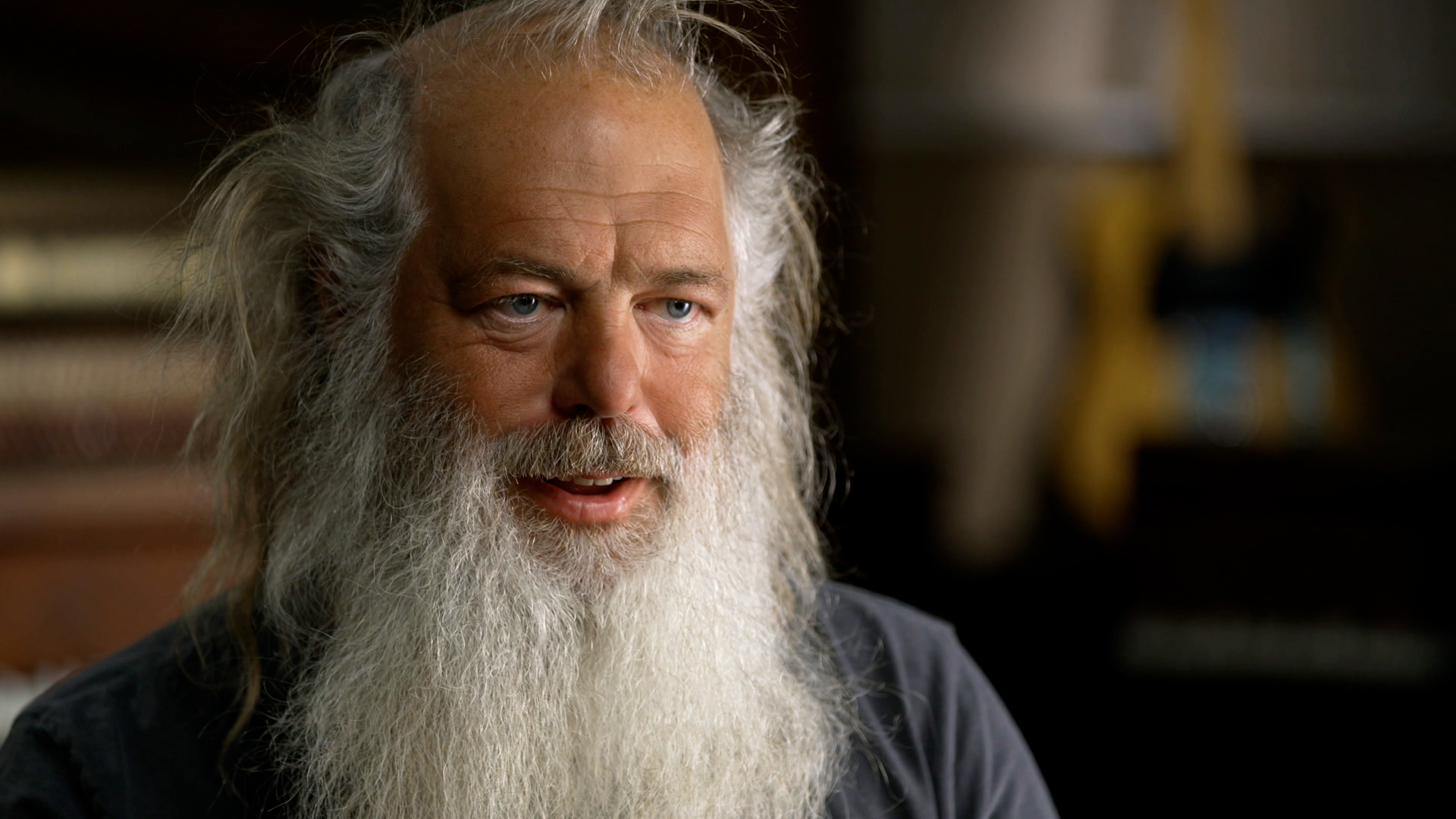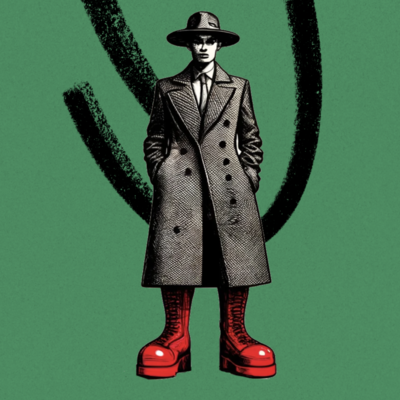
The Meditations of Vinyl Jesus
Music producer Rick Rubin explores the creative process
February 9, 2023
Sponsored By: BetterHelp
This essay is brought to you by BetterHelp. Millions of people have joined BetterHelp to find the right therapist for them, without having to leave home.
If Rick Rubin started a cult, I would be its first card-carrying member. Bathe me in goat’s blood, howl at the full moon, sacrifice a virgin to the god of music, I don’t care, I’ll do it—this dude is onto something.
For the uninitiated, Rubin is one of the most prolific and important music producers of all time. He started Def Jam records out of his NYU dorm room and brought hip-hop to the masses. He then moved…actually, you know what—let's skip the story. The bottom line is that he has helped make incredible music. Here are just a few of my favorite albums he's been involved in:
- Yeezus, Kanye West (one of the greatest rap albums ever written, unfortunately created by a Nazi)
- Reign in Blood, Slayer (top 10 metal album, one so delightfully full of rage it makes me want to punch a nun)
- 21, Adele (best selling album of the 21st century and the defining emo music for wine moms record)
- License to Ill, Beastie Boys (the first hip hop album to ever go to number one; unrelated but important: I’ve received three speeding tickets while blasting this)
I can do this all day—there are literally hundreds more. The list of albums he has been involved with is some of the most important music of the last 30 years. Most producers stick to a niche and make it their own. Rubin is the opposite, wildly careening from genre to genre, guided by his muse on where to go next. Thankfully for us, he recently published The Creative Act so we can learn how we, too, can be creative geniuses. The book is 404 pages of Rubin distilling his methodology for being creative.
Match with a licensed therapist within 48 hours.
Millions of people have joined BetterHelp to find the right therapist for them, without having to leave home. The affordable online platform offers live video and phone sessions, plus unlimited messaging.
Frankly, I went into the book skeptical. The genre of “successful person tells you how you can replicate their riches” is one that I’ve always struggled with. Most of these books are overly reliant on one person’s success and are not replicable in double-blind randomized control trials. While Rubin probably has more claim to a statistically significant success rate due to sheer album volume, why on earth would that apply to me? I am neither in music nor do I have his glorious beard. Plus, there is a bigger issue: I can’t stand anyone telling me what to do (as my wife, coworkers, and wife again would happily tell you), so advice books always rub me the wrong way.
Rubin would struggle to find a worse reviewer than me. Despite that, I found myself deeply moved by his book. Over and over again I would gasp, feeling like he was speaking directly to the problems that I face in my creative process. It was remarkable how quickly the switch from cynic to devotee occurred. Within three pages of cracking its slate gray cover open, I jumped up, dashed to get my good pen, opened a new pack of sticky notes, and started furiously scribbling in the margins. By the end of the book I found myself reinspired about my creative career to a degree I hadn’t felt in months.
So what did he say that spoke to me so?
The path of creativity
Rubin’s book is devoted to helping artists manage themselves. You might think that's not that valuable—isn't great music about chord progressions and mic specs? As someone whose bills are paid by their creativity, I can promise you that managing emotions is the hardest part of my job. That's why this book is great. It takes the question of emotional regulation seriously.
Rubin repeatedly reinforces that being an artist is not tied to technical skill. Perhaps the best example of this ethos is Rubin himself. I love how he explained what he did in a recent interview with Anderson Cooper.
Anderson Cooper: Do you play instruments?
Rick Rubin: Barely.
Anderson Cooper: Do you know how to work a soundboard?
Rick Rubin: No. I have no technical ability. And I know nothing about music.
Anderson Cooper: (LAUGH) You must know something.
Rick Rubin: Well, I know what I like and what I don't like. And I'm decisive about what I like and what I don't like.
Anderson Cooper: So what are you being paid for?
Rick Rubin: The confidence that I have in my taste and my ability to express what I feel has proven helpful for artists.”
It is likely Rubin is projecting a persona instead of being wholly accurate about his capabilities, but still, how can someone who “knows nothing about music” be so crucial to so many important albums? What does he actually do?
The best that I can tell after watching a four-part documentary about him on Showtime and listening to far too many interviews is that he helps artists navigate themselves. He may have occasional suggestions on how to improve the record, but much of his work is encouraging the artist to have the confidence to make decisions about their music themselves. In the book, he posits a path of creation for artists to follow:
- The universe is the “source” of all creativity. It is the source of an energy that we all tap into.
- The universe pushes this energy as “data” toward the artist. It’s a cacophony of emotions, visual stimuli, and sounds that the artist stores in a “vessel.”
- The artist develops a “filter” to determine what is allowed to reside in the vessel.
- The work of an artist is to shape their life so they can get closer to the source.
- They channel that source into something of personal value.
As I type this, I must admit to feeling embarrassed. It feels so trite to write it like this, and I’m filled with self-doubt about why the book appealed to me. But for whatever reason, when you crack open the book and Rubin explains his process, it feels meaningful.
Over the course of the book, Rubin goes into depth on how to do each step of this process. He does venture out of guru territory to offer pragmatic advice. For example, he encourages artists to mimic the greats of their field. “The objective is not to learn to mimic greatness, but to calibrate our internal meter for greatness,” he writes. “So we can better make the thousands of choices that might ultimately lead to our own great work.”
A common problem with which I struggle as a creator is how much to participate in the discourse. Many people make their living by having the spiciest take on the news of the day, and sometimes I wonder if I would be better off being a larger participant in the culture. Again, Rubin has useful advice: “It’s helpful to view currents in the culture without feeling obligated to follow the direction of their flow. Instead, notice them in the same connected, detached way you might notice a warm wind. Let yourself move within it, yet not be of it.”
Even with more practical tidbits, most of the book is devoted to the art of being (which makes sense, as the full title is The Creative Act: A Way of Being). Rubin is focused on helping creators find the best way possible to be themselves. The closer we get to this state of being, the more we can draw closer to the “source.” “Talent is the ability to let ideas manifest themselves through you,” he writes.
For someone who has worked with so many incredible artists, there are surprisingly no stories from the studio. I was hoping and expecting to learn about some of the insane things musicians had done to create their masterpieces. Instead, Rubin skips it entirely, save for a few brief mentions of “an artist I worked with.”
Some of the advice seems painfully obvious. In one section, he encourages people to go for a walk outside if they are feeling stuck—not exactly revolutionary. But after I finished, when I returned to his section on how nature is helpful for inducing creativity, I found that past Evan had highlighted, starred, doodled, quoted, exclamation-pointed, underlined, and noted how smart this was.
How can this advice simultaneously be so blase and so meaningful?
The challenges of guruship
Indulge me by participating in an exercise. Below are four quotes from the book. Please read them and stack-rank them by which speak to you the most.
- “Do not be conformed to the world, but be transformed by the renewing of your mind.”
- “Try setting aside time for ideation and don't judge your ideas harshly in the beginning. Instead, let your mind run free.”
- “In terms of priority, inspiration comes first. You come next. The audience comes last.”
- “The greatest risk is in not taking one.”
Got it? For me, it goes 4, 3, 1, and 2.
The problem is that only one of these is from Rubin. They are:
- A verse from the Bible that I used Google to translate into Polish, then Punjabi, then Icelandic, and back to English
- A ChatGPT prompt to give advice that is the opposite of what Rick Rubin would say
- The real quote
- A quote from a fortune cookie generator website I found
Rubin's advice feels right as you read it but in a vacuum is hard to distinguish from any other book written about creativity. I’m not even sure he believes that what he says is the one true way. After spending 100 pages arguing for a certain way of being, he says, “For every rule followed, examine the possibility that the opposite might be similarly interesting. Not necessarily better, just different. In the same way, you can try the opposite or the extreme of what’s suggested in these pages and it will likely be just as fruitful.” What the hell is that? Can you imagine if I wrote like that? But for Rubin, this argument works.
The problem for me with advice books is that I’m looking for rules that work 100% of the time. Take a question like: "How do I get to Rome?" Most gurus will tell you, “Well, you walk south over the mountains for 1,000 miles and eventually you get to Rome. That's how I did it, so it will work for you.” A better way to think about it is: it depends on where you're starting from. If you're starting north of Rome, then you have to go south. If you're starting from Greece, you've gotta take a boat.
So I don't think the sin of this book is that it has contradictory advice. If anything, it would help if it could be more prescriptive—for instance, if he could tell me when I should push through my writer’s block versus taking a break. How do I know which direction Rome is for me? But that's also intensely personal, so it's easier to say something more generic like "try some stuff and pay attention." This is deeply unsatisfying, but it's part of the great mystery that he's pointing to. The creative process (and anything else that is so psychological) is going to necessitate contradictory advice, because where you need to move is dependent on where you are.
Perhaps the real magic of this book isn’t the advice itself. It is generic. It is anodyne. But maybe that’s the point. The Creative Act isn’t an advice book. It is artistic permission given in written form. What makes this book so magical is that he somehow translates his gift in the studio to the page. Rubin’s task is not to tell you how to create or how to act. His book gives you permission to be yourself. As he says, “No matter what tools you use to create, the true instrument is you.”
I walked away from the book a changed creator. For the last few months, I’ve been circling around an argument for an unproductive life. I felt pressure to be “1% better everyday” so I could maximize the impact I have on the world. In The Creative Act, one of the greatest creators ever gave me permission to ignore that feeling. Rubin’s book encouraged me to be myself and be better for it. The concrete results are a new content strategy for the newsletter (I write whatever I want) with a new tone (I write exactly what I would want to read) and a new monetization strategy (I don’t think about the monetization strategy). Paradoxically, our publication has had one of its highest growth months ever.
His way of being has also bled over into my personal life. By believing that my life is my art, it gives me permission to not write. I can instead spend my time going to the sauna, playing video games, or reading novels. These things have no discernable connection to my day-to-day process of writing a technology newsletter. But I honestly feel like they help me be more creative, and Rubin gives me permission to do what I think helps me.
I cannot recommend this book for its advice. I cannot recommend it for its length. I cannot recommend its methodology as a replicable process for creation. What I can say is that if you are looking for permission to be something more, this book is the place to start.
Find Out What
Comes Next in Tech.
Start your free trial.
New ideas to help you build the future—in your inbox, every day. Trusted by over 75,000 readers.
SubscribeAlready have an account? Sign in
What's included?
-
Unlimited access to our daily essays by Dan Shipper, Evan Armstrong, and a roster of the best tech writers on the internet
-
Full access to an archive of hundreds of in-depth articles
-
-
Priority access and subscriber-only discounts to courses, events, and more
-
Ad-free experience
-
Access to our Discord community
Thanks to our Sponsor: BetterHelp
Thanks again to our sponsor BetterHelp. The affordable online platform offers live video and phone sessions, plus unlimited messaging.





Comments
Don't have an account? Sign up!